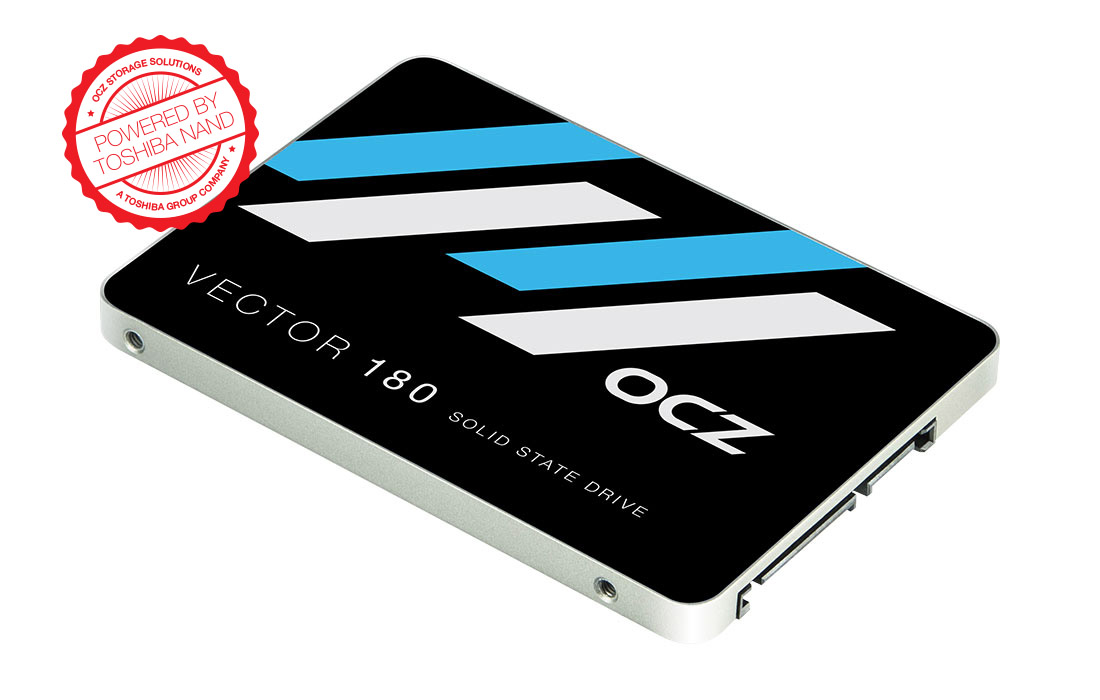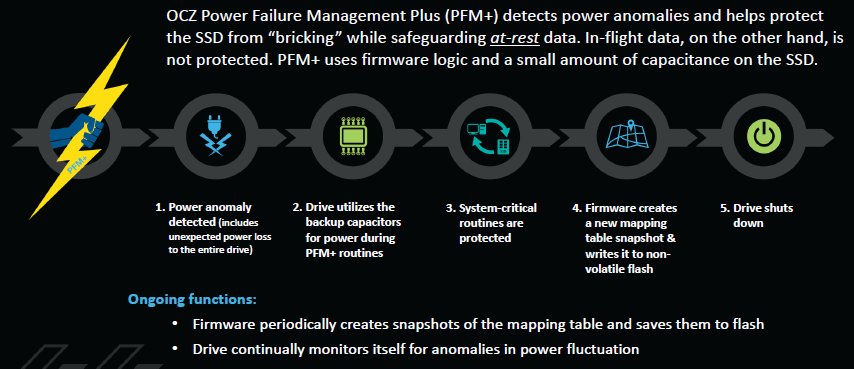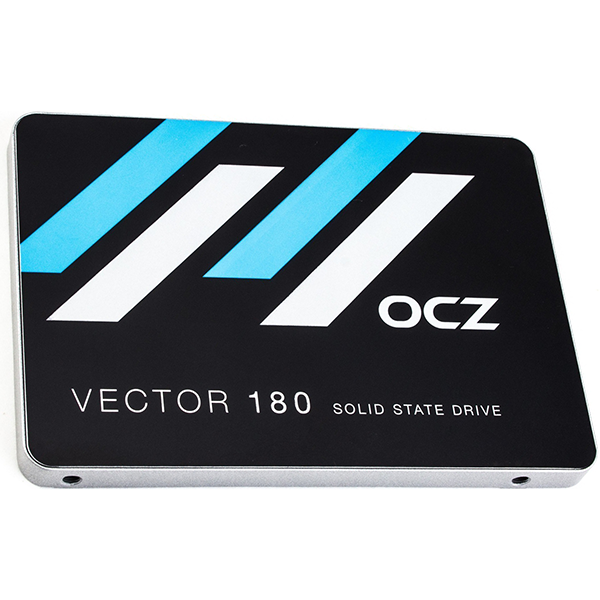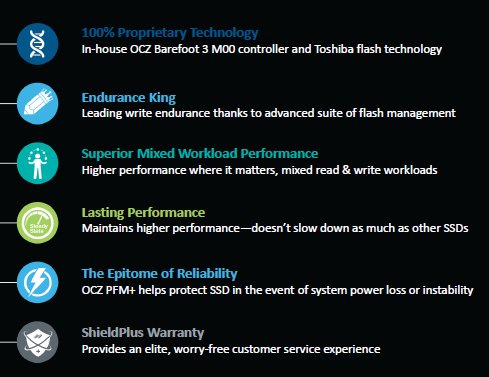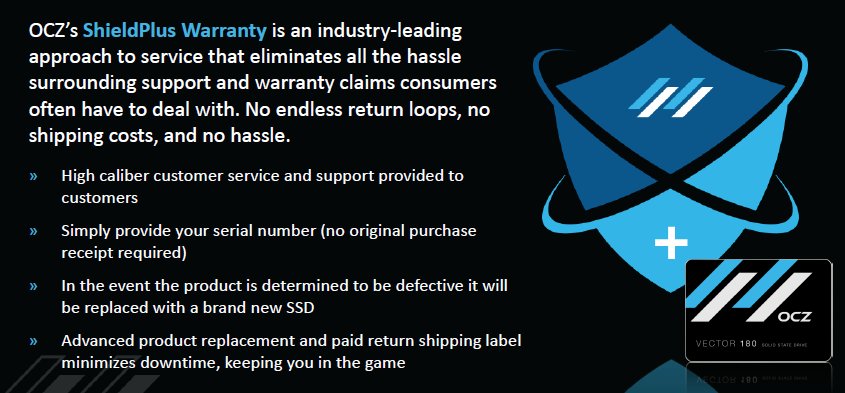Early Verdict
The Barefoot 3 controller gets one last flagship model before OCZ enters the NVMe era. New reliability features are nice as long as the performance penalty isn’t too high. Time will tell, but this could be the most reliable SATA-based SSD to come to market.
Pros
- +
Emphasis on reliability, higher mixed workload performance and in the top tier of overall performance.
Cons
- -
MSRP is too high at the start of the lifecycle to compete with 850 Pro and Extreme PRO. Reliability features could impact heavy workload performance.
Why you can trust Tom's Hardware
Introduction And Specifications
OCZ's recent reliability study claims that Vector 150 had a confirmed failure rate of .05% in 2014. The Vector 460 performed even better, with a failure rate of just 0.006%. But one failure is too many in the eyes of OCZ Storage Solutions, so the company is addressing a potential point of failure in its new Vector 180 by adding a capacitor to ensure data at rest can make it to the flash should you lose power.
Recently, OCZ Storage Solutions followed Intel and Plextor's lead, disclosing product failure rates dating back to the SandForce era. As expected, second-generation SandForce drives with a number of early firmware issues had a higher than normal return rate. The Vertex 4 series with Marvell's controller and OCZ firmware lowered returns significantly. But it was only when OCZ moved to Toshiba flash that the return rate dropped to its lowest levels.
The Vector 180 we're testing today is expected to cut into that critical figure even further thanks to Power Failure Management Plus (PFM+) technology.
PFM+ is more than just a capacitor on the PCB, used to keep critical components running long enough to flush data. In our testing, we observed the snapshot feature passing an image to the non-volatile flash every 20 seconds, while aggressively testing performance. Pardon me while I don my flame-proof suit (for the comments about to appear in the thread below), but OCZ may have built the most reliable consumer SSD ever.
In an earlier review, one of our readers mentioned that his or her way of testing an SSD was to first power cycle the drive twenty times to see if it still worked. Many dismissed his methodology. However, there is some validity to it. One of the easiest ways to break an SSD is to corrupt its page table map data. Over the years, we've found map corruption to be a big issue. We often encounter less-than-ideal weather in the Midwest, so country mile power outages are common in the Spring. Our notebook battery life test even ends with a power failure. That's not a graceful shut-down. We've killed more SSDs in our notebook power test than every other metric combined. Some drives simply prove more prone to this type of failure. One of my sons has a Crucial m4 in his system, and it's not uncommon for that SSD to experience a boot failure after inclement weather. The m4 rebuilds its map after being powered on for 24 hours, and a reboot brings the system back to life. That's fine for a kid's gaming system. But it's not acceptable in a notebook or desktop requiring 24/7 stability. OCZ's Power Failure Management Plus feature addresses those issues. However, there is a price to pay.
Our Vector 180 960GB sample uses two Micron 512MB DRAM packages, totaling 1GB of map data. The size is fairly standard on a terabyte-class SSD. Writing 1GB of data to flash takes almost two full seconds. And under heavy use, we observed several performance drops that lasted about that long. In normal client applications, you shouldn't run into a problem. But if your system is waiting to write data for two seconds every 20 or so, you'll notice the same phenomenon under taxing workloads.
Technical Specifications
OCZ will sell the Vector 180 in four capacities. Included is the company's first-ever terabyte-class flagship enthusiast product. The marketing names represent final capacity after over-provisioning: 120, 240, 480 and the 960GB model being reviewed.
Get Tom's Hardware's best news and in-depth reviews, straight to your inbox.
Even with its second-generation 19nm flash, the 120GB model still delivers solid performance. The 240GB and larger capacities increase sequential write speed to 530 MB/s, up from the 120GB drive's 450 MB/s. Random performance also scales as size increases. The 960GB model we're testing today delivers up to 100,000 random read IOPS and 95,000 random write IOPS.
OCZ rates the Vector 180 family at 50GB writes per day for five years. This endurance rating is exceptional, but also expected on the company's flagship enthusiast model.
For the first time that we can recall, a client-orientated SSD is tuned for mixed workload performance. I published an early look at mixed workload testing last August, and companies are starting to embrace the new (to client testing) methodologies. These optimizations will benefit users with lower latency while multitasking.
The Vector series' most prominent addition is the PFM+ feature that secures data at rest. This is a reliability-oriented feature, so its usefulness can only be measured over time by a large sample of end users. We did run one experiment with DriveMaster 2012, though, to see if the capacitor is able to power the critical components long enough to support data in-flight. This test sends data to the drive and then physically turns power off through a hub. Our results were mixed, though to be fair, the was designed for measuring in-flight (and not at-rest) transfers. The drive was power cycled over 100 times in a two-hour span and survived the abuse.
Pricing And Accessories
According to OCZ, the 120GB model will sell for $90, and as capacity increases, value per gigabyte improves. The 240GB version has an MSRP of $150, the 480GB should be priced around $275 and the 960GB flagship is expected to go for $500. Of course, the best value comes from that 960GB implementation at $0.52/GB, though OCZ's MSRP is higher than some other flagship SSDs. A lot of those products were introduced in 2014, so they have an advantage in time-on-market. Over time, prices on the Vectors will fall, too.
OCZ ships the Vector 180 with Acronis True Image cloning software, as well as a desktop adapter bracket and mounting screws.
Warranty
OCZ's ShieldPlus Warranty debuted alongside the Vertex 460 shortly after the acquisition by Toshiba. Its big advantage is cross-shipping, which minimizes downtime. OCZ will send you a replacement and return shipping label, so you aren't out of pocket on getting the damaged drive returned.
Current page: Introduction And Specifications
Next Page A Closer Look At The Vector 180
Chris Ramseyer was a senior contributing editor for Tom's Hardware. He tested and reviewed consumer storage.
-
damric Now that's what I'm talking about. Adding the capacitor should keep them from having so many RMAs from loss of power/hard resets. I usually only see the capacitor added to enterprise solutions, so I'm excited to see it as a feature in consumer SSDs.Reply
THW, you need to test all SSDs with about 50 of these hard power loss cycles and see which ones become unresponsive to motherboards and bricked. -
PraxGTI Intel has been doing this on consumer drives for reliability for a long time. OCZ cuts corners. From unstable DDR3 RAM to unreliable Vertex SSDs (Red light, bricked, within weeks of initial use), I for one won't buy OCZ products anymore without big warranties and longer-term support. I have never had an issue with an Intel drive, totally worth the extra money and reliable performance.Reply -
uglyduckling81 I thought OCZ was gone. I have had 2 of their drives and never had a problem. The only reason I'm not still using my original Agility is because my laptop got stolen, but I'm sure someone is still enjoying the speed it offered. That thing cost over AU$500 for 128gb but it was worth every cent.Reply -
I have two OCZ drives, with Terabytes written to them and no problems at all. The problems seem mostly hearsay or people that don't know how to read SMART data. One has 19 TB of writes (my vertex 3 doesn't show writes, but I'd estimate it's around that or higher). Both have around 19 000 hours of heavy use.Reply
That being said, with 3d NAND available, it just doesn't make sense to purchase anything except Samsung drives these days. I'm just waiting for prices to come down, and nvme.
But OCZ is very reliable, don't drink the kool-aid. -
ykki Hopefully this move (adding the capacitor) will also encourage(force?) other players in the market to follow suit.Reply -
damric Reply15546008 said:I have two OCZ drives, with Terabytes written to them and no problems at all. The problems seem mostly hearsay or people that don't know how to read SMART data. One has 19 TB of writes (my vertex 3 doesn't show writes, but I'd estimate it's around that or higher). Both have around 19 000 hours of heavy use.
That being said, with 3d NAND available, it just doesn't make sense to purchase anything except Samsung drives these days. I'm just waiting for prices to come down, and nvme.
But OCZ is very reliable, don't drink the kool-aid.
Out of 6 of my OCZ drives, 5 of them bricked after hard reset or power loss. I was able to raise my Agility 2 back from the dead though. Since then I've learned my lesson and I don't do heavy overclocking tuning/testing/benching on SSD to minimize crashes.
I've had other SSDs with same problem. It's most common on Sandforce, but I see it happen to Indillix and Micron controllers as well. -
David Cruit Wait. Forced shut downs screw up SSDs? I overclock a lot and I've done at least 100 forced shut downs, and my SanDisk Extremes (I not II) are still working as good as ever.Reply -
Reply15546281 said:15546008 said:I have two OCZ drives, with Terabytes written to them and no problems at all. The problems seem mostly hearsay or people that don't know how to read SMART data. One has 19 TB of writes (my vertex 3 doesn't show writes, but I'd estimate it's around that or higher). Both have around 19 000 hours of heavy use.
That being said, with 3d NAND available, it just doesn't make sense to purchase anything except Samsung drives these days. I'm just waiting for prices to come down, and nvme.
But OCZ is very reliable, don't drink the kool-aid.
Out of 6 of my OCZ drives, 5 of them bricked after hard reset or power loss. I was able to raise my Agility 2 back from the dead though. Since then I've learned my lesson and I don't do heavy overclocking tuning/testing/benching on SSD to minimize crashes.
I've had other SSDs with same problem. It's most common on Sandforce, but I see it happen to Indillix and Micron controllers as well.
Sounds like BS. You have 6 OCZ SSD? Let me guess, you have 30 TB of precious data and 196GB of ram. But no UPS?
I'll admit, I've never used their agility drives, I went with Vertex both times, 3 and 4.
Sorry if I sounded harsh, it's just your bash against OCZ sounds like every other (invented) one. How many people buy 6 drives? And why buy 6 SSD drives? And you have many other SSD drives, many of which went bad, with both Indillix and Micron controllers. It doesn't make sense.
If you work for a corporation, you have UPS and redundant power supplies. If you're an individual, you can't have had so much experience with so many hard-drives. So you're a liar. Like so many a-holes online that try to discredit OCZ. Everyone I know that has used OCZ has had great experience, except for early drivers that did cause problems, mostly lost data, rarely lost drives. -
NeatOman Corsair, Samsung, Sandisk, Intel.. the rest i don't care for, not worth taking a risk if a new generation is good or not. Those companies have a great reputation of only selling SSD's that are dependable. If its in a desktop and you don't have an UPS then look for a PFM, but IMO you shouldn't half ass it as it will still lose data because it wont write what is still in the RAM. It's only $40, and should be replaced every two years.Reply -
damric Reply15546723 said:15546281 said:15546008 said:I have two OCZ drives, with Terabytes written to them and no problems at all. The problems seem mostly hearsay or people that don't know how to read SMART data. One has 19 TB of writes (my vertex 3 doesn't show writes, but I'd estimate it's around that or higher). Both have around 19 000 hours of heavy use.
That being said, with 3d NAND available, it just doesn't make sense to purchase anything except Samsung drives these days. I'm just waiting for prices to come down, and nvme.
But OCZ is very reliable, don't drink the kool-aid.
Out of 6 of my OCZ drives, 5 of them bricked after hard reset or power loss. I was able to raise my Agility 2 back from the dead though. Since then I've learned my lesson and I don't do heavy overclocking tuning/testing/benching on SSD to minimize crashes.
I've had other SSDs with same problem. It's most common on Sandforce, but I see it happen to Indillix and Micron controllers as well.
Sounds like BS. You have 6 OCZ SSD? Let me guess, you have 30 TB of precious data and 196GB of ram. But no UPS?
I'll admit, I've never used their agility drives, I went with Vertex both times, 3 and 4.
Sorry if I sounded harsh, it's just your bash against OCZ sounds like every other (invented) one. How many people buy 6 drives? And why buy 6 SSD drives? And you have many other SSD drives, many of which went bad, with both Indillix and Micron controllers. It doesn't make sense.
If you work for a corporation, you have UPS and redundant power supplies. If you're an individual, you can't have had so much experience with so many hard-drives. So you're a liar. Like so many a-holes online that try to discredit OCZ. Everyone I know that has used OCZ has had great experience, except for early drivers that did cause problems, mostly lost data, rarely lost drives.
I had an Agility 2 (failed), Agility 3 (failed), 3 Vectors (all failed) (2 came from RMA), and 1 Vector 150 (still in use), I also have a PNY Optima (first one failed), and an m500. I'm on a first name basis with the OCZ techs, btw. They always do me good when it comes to RMA, despite the fact that I broke a lot of drives. They pay for all my shipping now, and upgraded my last Vector to the 150 which is still going strong despite the fact that I haven't been all that careful with it.
I test a lot of hardware in my lab, but I'm only a small time overclocker/bencher. I really don't own that much compared to a lot of the people around here. I only have 4x entry/mid-level gaming rigs up and running right now at the house.
You can check out my HWBOT profile and see the dozens of hardware submissions I have made over the years, if you still have doubt about my credentials, or just ask the mods around here.
